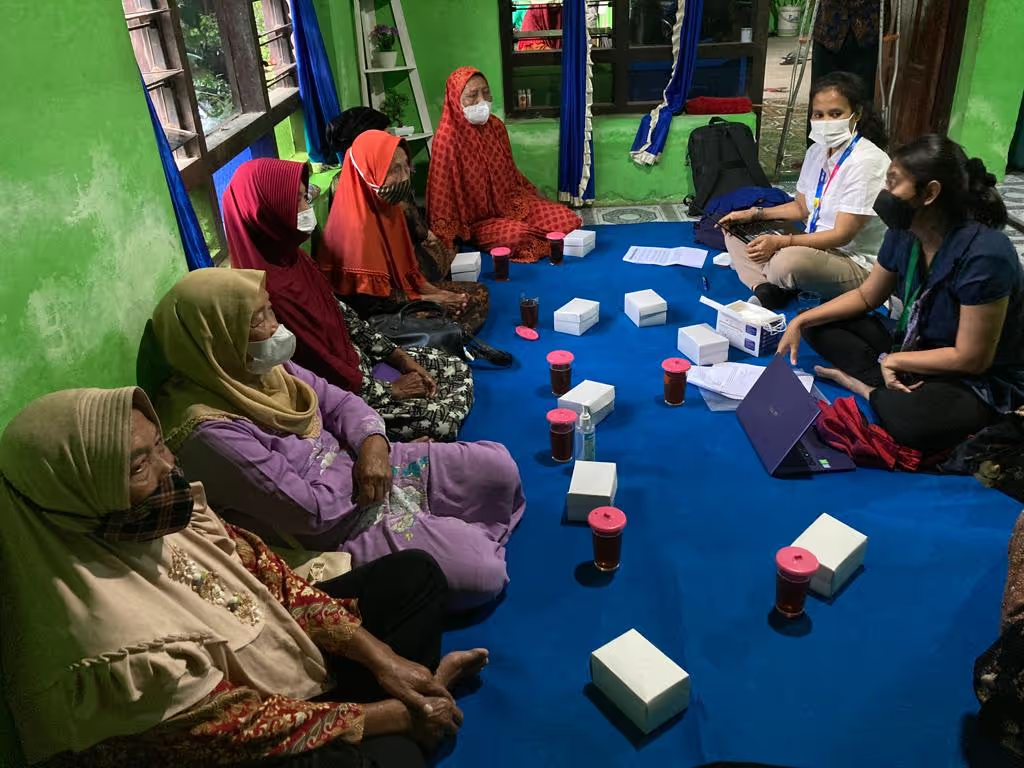Developing a gender-responsive early action protocol for disasters associated with volcanic eruption through FPAR

Project overview
FPAR and VFL build resilience to volcanic hazards by prioritizing local knowledge and needs, transforming disaster response from top-down control to collaborative action, and ensuring solutions are context-specific, inclusive, and sustainable.
Project solution
This project offers [specific solution or intervention] to tackle [challenge]. By implementing [strategies, tools, or innovations], the project aims to achieve [desired outcomes]. The approach is designed to [specific actions or methods] to bring about meaningful change in [community, region, or issue area].
Expected outcomes
This project aims to achieve [specific outcomes], such as [measurable results, improvements, or changes]. The expected impact includes [benefits to the target community, advancements in research or innovation, or long-term effects]. By the end of the project, we anticipate [specific changes or milestones] that will contribute to [broader goals or objectives].
What humanitarian need was addressed?
Klaten,a city in Java, Indonesia, lies at the foot of Mt. Merapi, an active volcano. Villages near the volcano face challenges in collecting and updating data on older persons (OP) and persons with disabilities (PwD), including children and youth with disabilities. These gaps hinder understanding of their specific needs across disaster phases. As a result, both OP and PwD struggle to participate meaningfully in disaster planning and response. Local governments also face difficulties in identifying vulnerabilities and ensuring inclusive, effective disaster risk reduction strategies that address the unique challenges faced by these at-risk groups.
What approach was taken to build evidence, and how did it support scaling?
This approach places communities at the centre of disaster preparedness and response, using FPAR (Feminist Participatory Action Research) and VFL (Views from the Frontline) to capture knowledge traditionally held by external actors. These participatory methods validate local experiences and enable communities to co-develop practical, context-specific strategies. Through inclusive workshops, community mapping, and real-time data collection, the approach generates actionable evidence that informs decision-making and supports adaptive learning.
The data gathered—on vulnerabilities, capacities, and lived experiences—has been critical in identifying gaps, shaping interventions, and building trust. It has also supported scaling by producing replicable models and culturally relevant insights applicable to other high-risk regions. This evidence base has strengthened funding proposals and attracted partnerships by demonstrating community ownership and measurable impact.
Ultimately, the approach has shifted humanitarian practice from top-down interventions to collaborative, locally led solutions, improving resilience, inclusion, and the effectiveness of disaster risk reduction efforts.
What progress was avchieved and what were the key learnings?
This approach empowered local communities—especially women, older persons, persons with disabilities, and their carers—to actively participate in disaster risk assessments and planning. A key milestone was the successful integration of FPAR and VFL methodologies, which enabled inclusive data collection and validated local knowledge. OP, PWD and carers contributed detailed insights into their daily and emergency needs, leading to more context-specific and responsive disaster strategies.
One challenge encountered was the initial lack of disaggregated data on vulnerable groups, which limited early planning efforts. However, this gap highlighted the importance of community-led data gathering. An unexpected outcome was the increased trust between communities and local authorities, which improved collaboration and long-term engagement.
A key learning is that inclusive, participatory approaches not only enhance the quality of data but also strengthen community ownership. Future projects should prioritize the voices of marginalized groups to ensure humanitarian responses are equitable, relevant, and grounded in the lived realities of those most at risk.
Future potential and lessons for innovation
The innovation demonstrated through FPAR and VFL methodologies shows strong potential for future application and evolution. A key lesson is the value of integrating qualitative insights from marginalized groups to complement quantitative data, allowing for a deeper understanding of the root causes and drivers of disaster risk. This participatory approach fosters inclusive decision-making and builds trust between communities and authorities.
Looking ahead, there are clear opportunities to expand the methodology to other high-risk volcanic zones and hazards, adapting it to diverse cultural and geographic contexts. Future initiatives can build on this foundation to develop more resilient and inclusive disaster response frameworks, co-designed by communities and local authorities. Implementing participatory processes will enhance preparedness and ensure that responses are tailored to the actual needs of older people, persons with disabilities and their carers.
This innovation offers a scalable, adaptable model for humanitarian actors seeking to improve equity, effectiveness, and sustainability in disaster risk reduction and emergency response.
Dissemination
Through the Views from the Frontline (VFL) approach, structured data dissemination—driven by community-led documentation and reporting—has enhanced transparency and deepened collaboration between communities and local governments. By sharing locally collected data and lived experiences, residents have become trusted partners in disaster risk planning, encouraging authorities to integrate community insights into official strategies. This shift has fostered mutual trust and improved coordination during volcanic emergencies.
A key milestone was the presentation of a project paper at the International Conference on Disaster Management (ICDM) in Indonesia, highlighting the adoption of inclusive tools and their potential for broader application.
To ensure accessibility and local engagement, materials were shared through bilateral meetings, the development of a braille book, and a video showcased during National Disaster Risk Reduction (DRR) Day. These efforts promote inclusive policymaking and aim to strengthen collaboration between local officials and organizations of persons with disabilities (OPDs).
Project delivery & updates
Stay up to date with the latest developments from this project. Here, you will find details on what has been delivered, resources created, and regular updates as the project progresses. Access key documents, reports, and other materials to see how the project is making an impact.